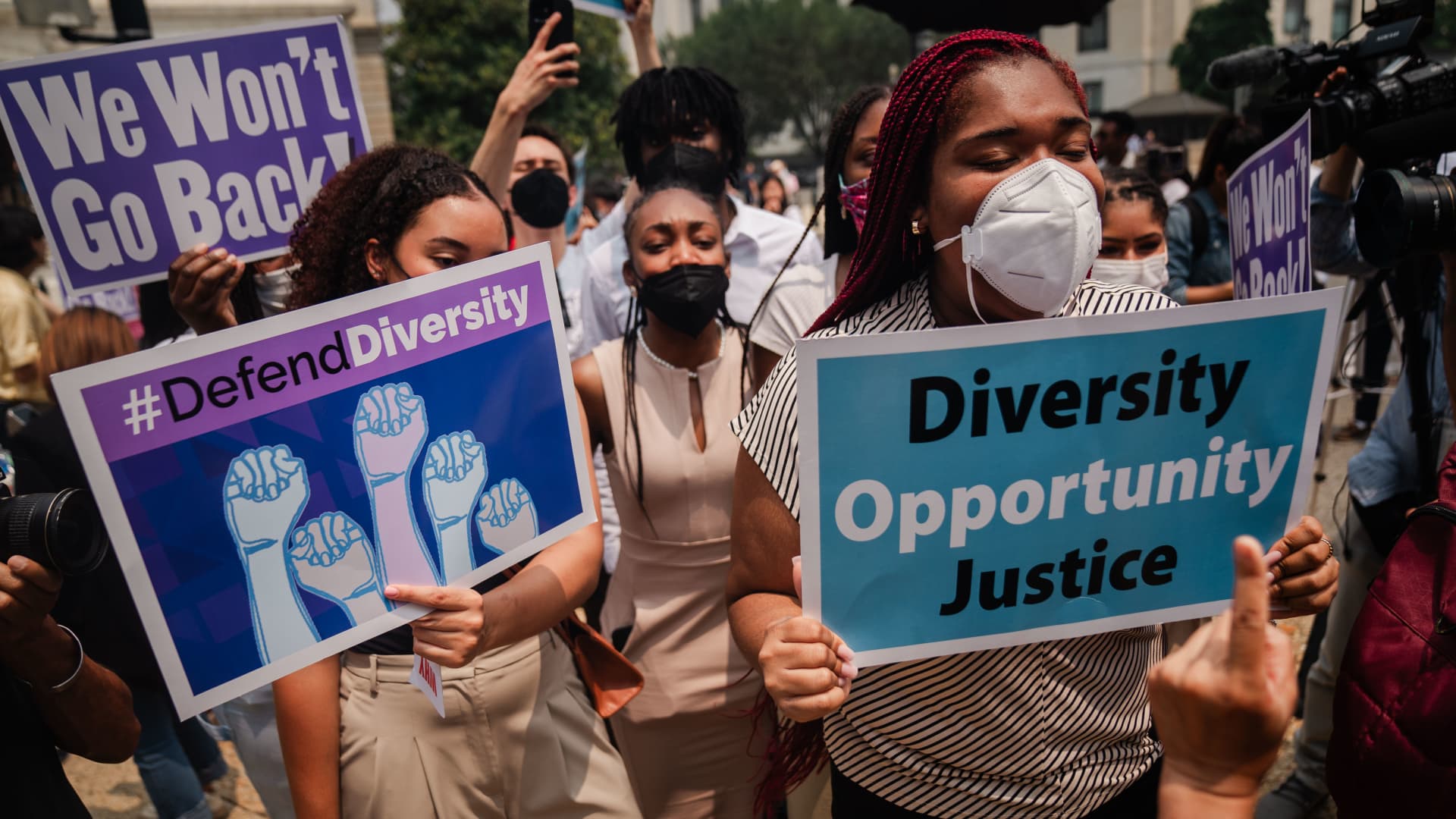Affirmative action has been a topic of intense debate, with supporters and counterprotesters clashing outside the Supreme Court. But the implications of the recent ruling on college admissions go beyond the courtroom, as major businesses express concerns about how it could impact their diversity goals and hiring practices.
Companies like Apple, General Electric, Google, Salesforce, and Starbucks believe that racial and ethnic diversity are essential for enhancing business performance. They filed a brief in support of Harvard University and the University of North Carolina, stressing the importance of student-body diversity on college campuses. These businesses rely on universities to recruit and train highly qualified, racially and ethnically diverse students who will become future employees and leaders.
With the Supreme Court’s decision striking down race-conscious admissions, employers may face challenges in finding diverse talent. While the ruling specifically addresses university admissions and does not mandate changes in hiring practices, experts believe it will still have an impact on hiring and retention strategies. Additionally, the ruling may create legal uncertainty for businesses that promote diversity in their recruitment efforts.
There is speculation about the potential legal implications of the ruling on employers’ diversity initiatives. Some Republican officials argue that companies’ diversity programs could be considered unlawful discrimination. Democratic officials counter this interpretation, asserting that it is incorrect.
Jocelyn Samuels, Vice Chair of the bipartisan Equal Employment Opportunity Commission, predicts that the Supreme Court’s decision will hinder efforts by colleges and universities to enroll diverse student bodies, narrowing the pipeline for diverse and inclusive workforces.
The ruling’s effect on businesses is a cause for concern. It is feared that universities, which have traditionally been reliable sources of diverse talent, may no longer be as effective in this regard. Lorraine Hariton, President and CEO of nonprofit firm Catalyst, warns that the diverse talent pool for hiring, advancement, and leadership will shrink, potentially challenging workplace diversity initiatives.
Past examples support this prediction. After the University of California eliminated affirmative action in 1996, the participation of underrepresented groups dropped by 12%. Similarly, when the University of Michigan banned race-conscious admissions, Black undergraduate enrollment nearly halved. This indicates that companies may struggle to recruit the same level of diversity if they continue relying on traditional methods.
Kim Waller, Senior Client Partner at Korn Ferry, suggests that companies can still fulfill their diversity commitments by focusing on training and promoting internal talent for senior roles. Investing in internship programs is another avenue for finding diverse employees. However, Waller acknowledges that demographic changes may lead to a shift in the makeup of colleges, with more nonwhite and Hispanic students entering higher education.
Business leaders also worry that restrictions on college admissions will harm the United States’ competitiveness on the global stage. Ahmad Thomas, CEO of the Silicon Valley Leadership Group, believes that strong diversity and inclusion efforts drive business outcomes. He expresses concern that the lack of diversity in higher education institutions may discourage high school students from marginalized backgrounds from pursuing STEM programs.
Despite recent progress, minorities remain underrepresented, especially in leadership positions. Black candidates filled just 8.3% of board directorships in 2023, highlighting the need for more inclusive recruitment practices.
To maintain diversity hiring initiatives in the face of a less diverse talent pipeline from elite universities, businesses may need to get more creative in their recruitment efforts. This could involve ramping up recruitment at historically Black colleges and universities, minority-serving institutions, and large state universities. Other approaches could include partnerships between businesses and universities that support the development of students from diverse backgrounds.
Adam Kovacevich, founder and CEO of the Chamber of Progress, suggests that companies may need to reassess their biases about which schools they recruit from, broadening their focus to include institutions that have historically had affirmative action admissions policies.
Investing in children’s education in disadvantaged communities, particularly at the grade school or high school level, and forming partnerships with HBCUs and community colleges are seen as potential solutions. However, it is acknowledged that the responsibility for addressing these challenges lies not solely with the private sector but also with government.
Despite efforts to promote diversity, women and racial minorities continue to face significant disparities in representation and pay compared to white males. These disparities prompted many companies to prioritize diversity, equity, and inclusion initiatives following the murder of George Floyd. However, progress made in the past year has been disrupted by the recent ruling on affirmative action.
In conclusion, the recent Supreme Court ruling on affirmative action in college admissions has raised concerns among business leaders regarding their diversity goals and hiring practices. Companies are apprehensive about the impact on finding diverse talent and the legal uncertainty surrounding diversity initiatives. They may need to explore alternative recruitment strategies and partnerships to maintain their commitment to diversity. The ruling’s effect on college admissions could hinder workplace diversity efforts and have broader implications for the competitiveness of the United States. It is crucial for businesses and educational institutions to actively address these challenges and strive for equitable outcomes.
Denial of responsibility! VigourTimes is an automatic aggregator of Global media. In each content, the hyperlink to the primary source is specified. All trademarks belong to their rightful owners, and all materials to their authors. For any complaint, please reach us at – [email protected]. We will take necessary action within 24 hours.


